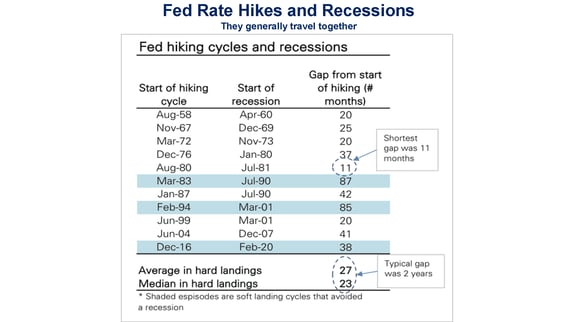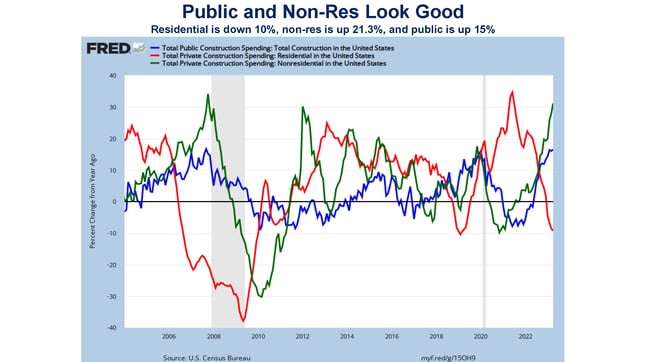
2023 Mid-Year Economic Forecast Recap
Key Indicators Hint at Mild Recession in Michigan’s Near Future
By Phil Allmen
The Construction Association of Michigan (CAM) and the Home Builders Association of Southeastern Michigan (HBA) partnered to present the 13th annual Mid-Year Economic Forecast and State of the Industry Breakfast on Tuesday, June 20th. The event is intended to provide a comprehensive overview of the impact of current and projected economic factors on the construction industry. Elliot Eisenberg, Ph.D., chief economist for consulting agency GraphsandLaughs LLC, presented the forecast.
Job growth will slow, and the economy will weaken in the latter half of 2023, according to economist Elliot Eisenberg. But the future is not all doom and gloom for Michigan businesses and residents as several economic sectors remain strong. So, if there’s a recession – and Eisenberg suspects the country will enter one – it should be comparatively mild.
Known as the “Bowtie Economist,” Eisenberg’s voice has appeared in many publications, including Bloomberg, Business Week, Bureau of National Affairs, Forbes, and Fortune. He is also a member of the expert advisory board of Mortgage Market Guide and is a regular consultant to several large real estate professional associations, hedge funds, and investment advisory groups. He addressed about 250 guests at the annual Mid-Year Economic Forecast and State of the Industry Breakfast, held at Suburban Collection Showplace on June 20th.
Eisenberg doesn’t expect that the recession will be similar to those in most people’s memories. “Not all recessions are the same. Some recessions are a real doozy,” he said, referencing major recessions in 1974-1975, 1980-1981, and 2008-2009. “This one will be like 1990 or 2001: milder recessions you just don’t recall.”
The various economic indicators used to predict recessions, however, are not present. Car sales and home sales, for example, are not tanking right now, Elliot said, but are usually impacted by a recession.
Those predictable indicators are misaligned as a longer-term result of the COVID-19 pandemic, which decimated the service industry at its onset, then wreaked havoc on regular supply and demand issues and strained the supply chain. Scarcity of goods and government stimulus payments pushed inflation higher, prompting the Federal Reserve to increase interest rates higher and higher in its effort to bring inflation back down to manageable levels and hopefully stave off any recession.
Eisenberg said that inflation levels have dropped back off, but it appears that federal officials want to make sure that the inflation rate doesn’t rise again by keeping interest rates higher now instead of lowering them back down. At least one, if not two, more interest rate hikes are expected this year.
Another indicator that Eisenberg said predicts an impending recession is consumer confidence. Small business owner and company CEO consumer confidence levels are extremely low. Historically, recessions tend to follow such periods of low confidence.
“A recession typically comes two years after the first rate hike,” Eisenberg said. “That would be March 2024” -- though he personally thought the recession would start earlier than that.

On the positive side, new construction trends (post COVID-19) show promise, particularly in non-residential projects. Construction activity increased about 25 percent compared to this time last year. Single-family residential has potential, too. Historically low interest rates pushed home ownership and limited supply. That low inventory offers builders an economic opportunity. Manufacturing is getting a push from new microchip facilities getting built across the country.
And publicly-funded projects are on the rise as a result of federal stimulus funds. At the beginning of 2023, Michigan and its largest counties and cities had only spent about $2.2 billion of the $10 billion awarded. Another $4 billion was budgeted, but not spent. Officials have until the end of 2024 to obligate their funds.
Overall, Eisenberg said that everyone should be prepared to see the economy weaken over the second half of 2023 as job growth slows down. The Federal Reserve will raise interest rates at least one more time. Inflation is clearly declining, but companies should watch both the inflation and unemployment rates moving forward to see if those trend upward.

The Mid-Year Economic Forecast is made possible through the generous support of our sponsors. Platinum sponsors for the 2023 event were Consumers Energy, D.A. Alexander, Doeren Mayhew CPAs and Advisors, Lake Michigan Credit Union, Michigan.com, and Security 101. Gold sponsors included CG Financial Services, CTC, Image Technology, John E. Green, Lazear Capital Partners, MISS DIG 811, Operating Engineers Local 324, Southeastern Michigan Chapter NECA, and Testing Engineers & Consultants, Inc.
Quick Links
 Elliot Eisenberg, Ph.D. is an internationally acclaimed economist and public speaker specializing in making the arcana and minutia of economics fun, relevant and educational. He earned a B.A. in economics with first-class honors from McGill University in Montreal, as well as a Master's and Ph.D. in public administration from Syracuse University. Eisenberg, a former Senior Economist with the National Association of Home Builders in Washington, D.C., is the creator of the multifamily stock index (the first nationally recognized index to track the total return of public firms principally involved in the ownership and management of apartments), the author of more than eighty-five articles, serves on the Expert Advisory Board of Mortgage Market Guide and is a regular consultant to several large real estate professional associations, hedge funds, and investment advisory groups. He has spoken to hundreds of business groups and associations, often as a keynote speaker. Learn more at https://econ70.com.
Elliot Eisenberg, Ph.D. is an internationally acclaimed economist and public speaker specializing in making the arcana and minutia of economics fun, relevant and educational. He earned a B.A. in economics with first-class honors from McGill University in Montreal, as well as a Master's and Ph.D. in public administration from Syracuse University. Eisenberg, a former Senior Economist with the National Association of Home Builders in Washington, D.C., is the creator of the multifamily stock index (the first nationally recognized index to track the total return of public firms principally involved in the ownership and management of apartments), the author of more than eighty-five articles, serves on the Expert Advisory Board of Mortgage Market Guide and is a regular consultant to several large real estate professional associations, hedge funds, and investment advisory groups. He has spoken to hundreds of business groups and associations, often as a keynote speaker. Learn more at https://econ70.com.
Recent Posts
-
CAM NewsBriefs – February 16, 2026
eNews
-
Recap: 2026 Great Lakes Design and Construction EXPO
CAM News
-
CAM Magazine's February 2026 Issue Is Ready to View
CAM Magazine
-
One Industry, One Resource: Why CAM Membership is the Ultimate Investment for Michigan Contractors
Member Benefit
-
CAM Introduces 2026 Board Members
CAM News
-
CAM Announces the 2025 Project of the Year
CAM News
